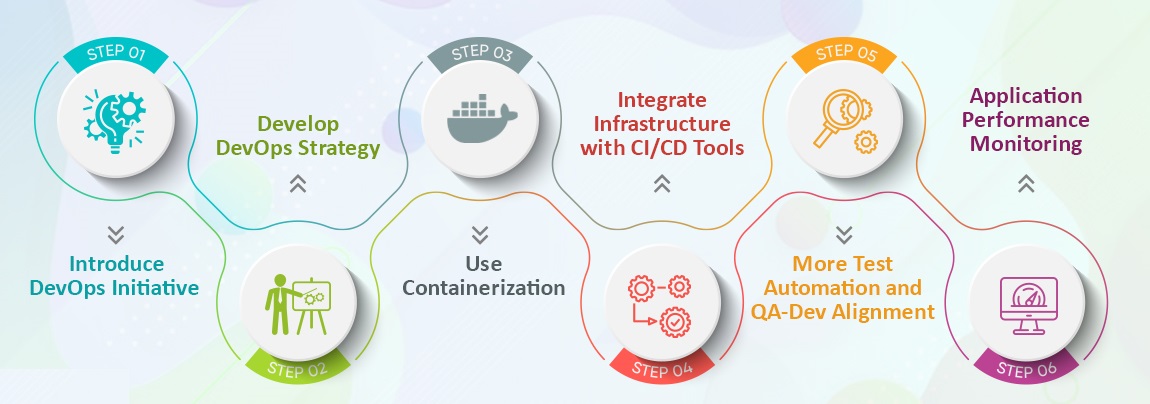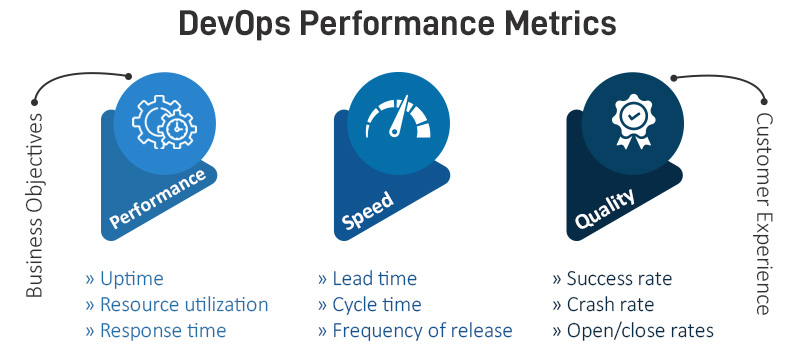DevOps Implementation
Tap the Untapped DevOps Potential With Effective Tools
In the growing IT industry, being in line with changing trends and rapidly transforming consumer behavior have been significant global challenges for IT firms. In the process, IT solutions that enhance organizational capabilities for high-paced product development, faster delivery of applications and services, and timely marketing of products and services remain the need of the hour for every firm to gain a competitive edge.
Our DevOps methodology appears as a one-stop solution for all the abovementioned requirements! As an amalgamation of cultural practices and tools that enhance functional abilities, the DevOps model unifies two different development and operational teams across the entire application lifecycle while ensuring quality and security.
DevOps Strategy and Implementation
Veritis DevOps teams use a technology stack and tooling functionalities to operate and manage applications. Our DevOps implementation strategy is based on six fundamental factors:
Speed
Through our DevOps model, we ensure that faster innovation and speedy execution are crucial to customer satisfaction and staying ahead of the competition.
Rapid Delivery
Our DevOps implementation involves persistent delivery cycles (which could be minor updates) and a minimum recovery time (in case of any failure) through Continuous Integration practice, thus allowing further and faster innovation.
Reliability
We ensure functional, safe, and quality output through DevOps continuous integration and delivery practices, resulting in a positive end-user experience. Overall, our DevOps program ensures developers’ productivity and operations’ reliability.
Scale
Our Infrastructure as a code practice helps efficiently manage all stages of the software product lifecycle (development, testing, and production).
Improved Collaboration
Veritis DevOps methodology is built on a cultural philosophy that focuses on development and operations working in a collaborative environment, which reduces multiple iterations, inefficiency, and time complexity.
Security
Our DevOps model achieves this through configuration management techniques and automated compliance policies. Besides, we also work on the concept of DevSecOps, a new integration to address the security challenges in DevOps implementation.
DevOps Implementation Roadmap
The successful implementation of the DevOps strategy requires an effective ‘implementation roadmap’:

The DevOps Implementation Roadmap Involves Six Steps:
Introduce DevOps Initiative
The Company’s CIO is crucial in introducing a DevOps initiative as a part of the organization’s IT activity and facilitating requirements such as investment and human resources. Accordingly, changes are made to the development and operations activities, and the program manager designs a DevOps strategy and monitors its implementation.
Develop DevOps Strategy
The best practices that enhance team collaboration and facilitate new ways of infrastructure provisioning, software development, and testing are crucial to DevOps strategy. Our program managers set a common goal and align teams in a shared environment. We implement the Infrastructure-as-Code (IaC) mechanism to automate testing, integration, deployment, and release processes.
Use Containerization
We implement containerization to ensure software reliability while traversing between processes. Through containerization, individual parts of the software run independently of the overall infrastructure and add to their abilities to run in any environment without dependencies. Moreover, our container packaging helps Ops teams manage applications quickly in case of any change required for a specific microservice.
Integrate Infrastructure With CI/CD Tools
Integrating infrastructure automation tools like Kubernetes, Ansible, and Chef with CI/CD tools like Jenkins, Bamboo, or GoCD can address configuration management concerns and effective deployment. These tools prepare containers for risk tolerance through continuous monitoring and rolling software updates.
More Test Automation and QA-Dev Alignment
We recommend test automation to achieve faster delivery cycles. Functional testing can remain manual depending on the extent of test automation cases. On the other hand, QA-Dev alignment is crucial to address post-release issues. This alignment helps in early bug detection and helps address the issue before the release of the next build.
Application Performance Monitoring
Application performance monitoring helps detect, prioritize, and isolate application defects and their root causes using respective software. These issues are usually revealed during application server and UX monitoring activities. Now, you are all set for a perfect DevOps implementation!
Six Aspects That Decide DevOps Success
Through our DevOps practices, we ensure faster and regular product updates, offering a customer-friendly approach and redefining software delivery:

Continuous Integration
Through this practice, we promise early problem detection, faster failure recovery, quality assurance, and less turn-around time before the product is released. It is a great way to avoid last-minute issues and helps instantaneously leverage feedback.
Continuous Delivery
We use this engineering approach to ensure that software update releases are phased and reliable. Through our service, we aim to reduce deployment risks and initiate the deployment process with accuracy. This helps reduce the new release timeframe, improve product quality, and work on bugs promptly.
Infrastructure as a Code
We offer enhanced resource management through optimally priced implementation and real-time deployments. We aim to improve consistency and offer quality resource management through various options.
Configuration Management
Codifying infrastructure and its relevant configurations with the cloud helps firms monitor, track, validate, and reconfigure infrastructure in an automated procedure. This helps you control resources while monitoring their security and ensure compliance in a cloud environment.
Policy as a Code
Codification of infrastructure and its relevant configurations with the cloud helps firms monitor, track, validate and reconfigure infrastructure in an automated procedure. In a cloud environment, this helps you control resources while monitoring their security and ensure compliance.
DevOps Performance Metrics
Overall, our DevOps practices ensure faster product release and drive innovation while dealing away with complexities in collaboration among teams, ensuring security, automating manual tasks, and managing complex environments.
Microservices
Through this, we offer a toolset to address any configuration or scripting issues that ensure effective deployment and scaling.
DevOps Implementation Business Benefits
A well-structured DevOps implementation strategy improves upon concerns such as the siloed functioning operation and dev teams, the lack of understanding of domain specifics from the operation teams, and varied team goals and objectives.
To negate the lack of a clear-cut approach, we help you in increasing overall performance and productivity:
Increased Collaboration
In a DevOps-based organization, employees would work within common grounds of transparency, clear feedback, and responsibility sharing. This makes establishing higher understanding and trust easy, leading to effective collaboration.
Better Performance
In a conventional software development project, several independently working teams would work on a singular piece of code, leading to redundancy, higher inefficiency, and decreased software performance. Our DevOps services team works towards frequent releases, cuts rework time, brings down errors, reduces time for system recovery, and enhances time-to-market.
Quality Client Experience
Our DevOps methodology fastens the software development process, which helps in accommodating volatile market conditions and client preferences. The collaboration initiative makes it easy to cut down the production cycle and ensure faster time-to-market.
Cutting Out on Expenses
Through proper collaborative efforts, our DevOps deployment strategy helps minimize your departments’ production costs because maintenance and new updates are unified into one area for consideration.
DevOps Implementation and Business Impact
Global Market Forecast
USD 9.41 billion by 202318.7% CAGR
19.7%
Expected CAGR of the DevOps Platform market during 2023-2880%
Of organizations that have already implemented DevOps as of 2023440X
Faster lead time for changes with DevOps principles22%
Minimized time on unplanned work and rework with DevOps practices42%
Strong DevOps culture across multiple teams within a department200X
Deployment frequency of firms with DevOps compared to those without24X
Frequency of faster recovery from failure and minimized downtime with DevOpsWhy Choose Veritis for DevOps Implementation
Our DevOps agile methodology helps establish quick development cycles, which come with an active code production and deployment system. Through Veritis, we ensure continuous deployment that makes your software release-ready and ready for delivery.
We ensure tracking SLAs along with key metrics that shape the development process. Hence, we create high business value and deploy quality agile applications through outcome-based measures and monitoring processes.
Our DevOps becomes easier with expert support, and we have successfully driven DevOps implementation across industries in the US.
Sign up with us and stay ahead of the competition! Get Started Now!